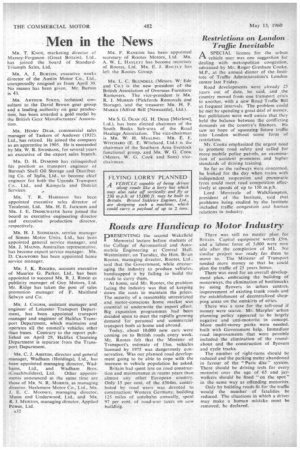Roads are Handicap to Motor Industry
Page 34

If you've noticed an error in this article please click here to report it so we can fix it.
PRESENTING the second Wakefield Memorial lecture before students of the College of Aeronautical and Automobile Engineering at Central Hall, Westminster, on Tuesday, the Hon. Brian Rootes, managing director, Rootes, Ltd., said that the Government, while encouraging the industry to produce vehiclas, handicapped it by failing to build the roads to carry them.
At home, said Mr. Rootes, the problem facing the industry was that of keeping down the costs to maintain the prices. The security of a reasonably unrestricted and motor-conscious home market was essential to underwrite the export effort. Big expansion programmes had been decided upon to meet the rapidly growing demand for personal and commercial transport both at home and abroad.
Today, about 10.000 new cars were coming on to British roads every week. Mr. Rootes felt that the Minister of Transport's estimate of 15m. vehicles licensed by 1975 was dangerously conservative. Was our planned road development going to be able to cope with the increase in vehicle population he asked.
Britain had spent less on road construction and maintenance in recent years than almost any other European country. Only 15 per cent, of the £564m. contributed by road users was devoted to construction: Western Germany, building 125 miles of autobahn annually, spent 97 per cent. of road-user taxes on new
There was still no master plan for Britain. Capital equipment worth 15m. and a labour force of 5,000 were now idle after the completion of Ml. No" similar project was ready for them to move to. The Minister of Transport needed more money so that he could plan the traffic of 25 years hence.
There was need for an overall development plan, embracing the building of motorways, the elimination of bottlenecks by using flyovers in urban centres, improvement of existing trunk roads and the establishment of decentraliaed shopping areas on the outskirts of cities.
There was a case for the toll-road if money were scarce. Mr. Marples' urban planning policy appeared to be largely negative and anti-motorist in concept. More multi-storey parks were needed, built with Government help. Immediate road improvements that were possible included the elimination of the roundabout and the construction of flyovers and cycle tracks.
The number of right-turns should be reduced and the parking meter abandoned in favour of the "Paris disc" system. There should be driving tests for every motorist over the age of 65 and jaywalkers should be fined "on the spot" in the same way as offending motorists.
Only by building roads fit for the traffic would the number of fatalities be reduced. The situations in which a driver may make a human mistake must be removed, he declared.




































































































